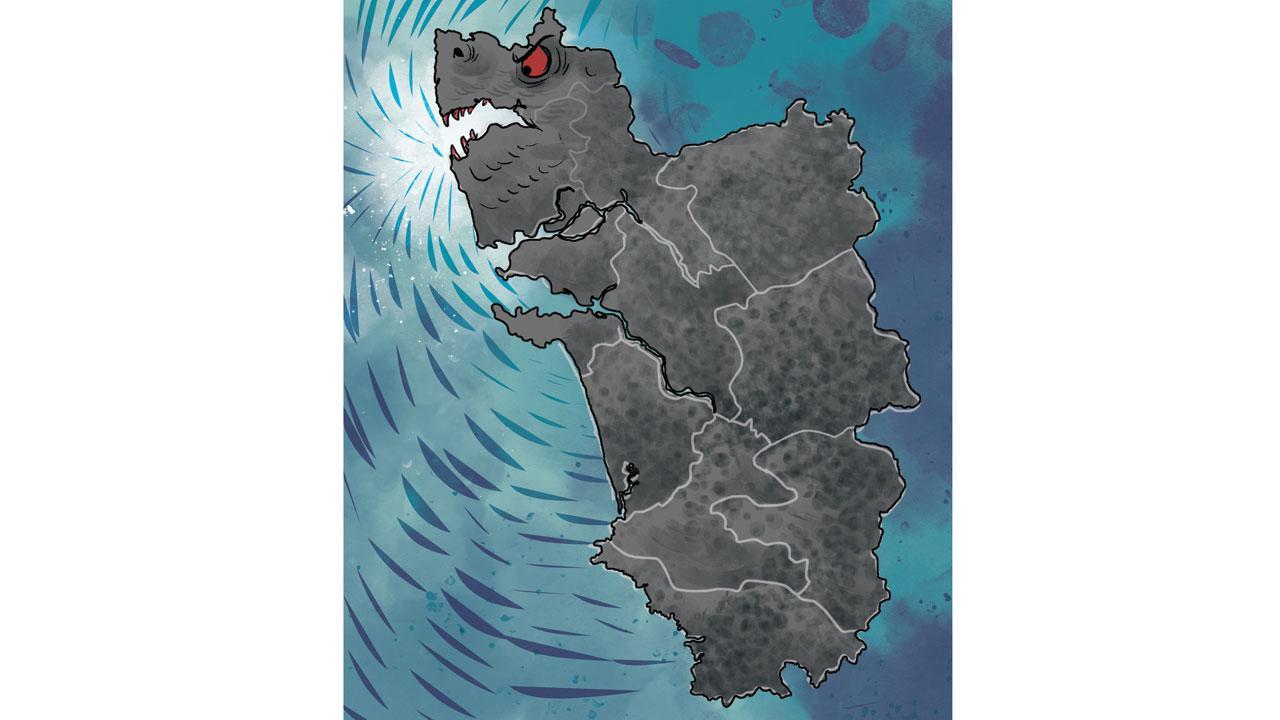I last came to my fatherland in late 2017, there is some taking for granted here, it’s that ‘ghar ki murgi dal barabar’ thing—Maaf kor!

Illustration/Uday Mohite
 Patrao: Portugese word for “boss”
Patrao: Portugese word for “boss”
Deu boro dis dium: Good morning
Adeus: Goodbye
Maaf kor!: Forgive me
Dev borem karun: Thank you
Dear Patraos
Deu boro dis dium, all you feni-guzzling landowners sitting on your balcaos, fishermen, ravaged by the elements out on the high seas trawling for squid and clams, fat contented owners of beach shacks, Fathers listening to confession after Sunday mass in their white-walled churches, frock dressed aunties arguing in the market over the price of “chonak” and “chorizo”.
As I board the plane, from the incredible MOPA airport, to return to Mumbai having dealt with some property issues, (a 350-year-old home takes some maintenance), my mind is filled with conflicting thoughts.
I last came to my fatherland in late 2017, there is some taking for granted here, it’s that ‘ghar ki murgi dal barabar’ thing—Maaf kor!
Patraos all, every time I visit your fair land, Goa seems a little changed… the landmarks are the same, but the landscape is just that little transformed. Some new “hero” is attempting to commercially transform the state in the name of “preserving culture”.
The arrogance of the invader, who feels he can walk into Goa and feel entitled to change stuff, it’s uncouth and un-cool.
Your CM wants to “stamp out any stain of the Portuguese” ! Sir, changing the face of Goa isn’t your birthright—I learnt a new term this week, “cultural syncretism”, means different cultures coming together to create a new subculture— that’s the uniqueness of Goa. This is a social fabric, a tapestry woven over years of tumult and tolerance. Restoration isn’t reformation, yes?
See Patraos, I know you’re a peaceful people, it’s not your way to object forcefully, but you do implode, I can see it—the Russians thought they could invade Morjim… (that is their way, as recent history has revealed)—road signs, menus all suggesting “Little Moscow”, the Israelis kind of strutted into Arambol… flexing their muscles.
South Delhi has honked its car horns into North Goa. The gentle Anjuna resembling the garish Greater Kailash, Vagator, now a sad version of Vasant Vihar, building
multi-storey structures… ogling at the women, jumping into assorted water bodies, fully clothed.
Look I don’t want to be that back-seat driving, out-of-station person, giving orders with no accountability—but it galls me that anyone feels they can “change Goa”, not integrate, not assimilate, but “wipe away the remains of the Portuguese”, callously decimating 450 years of preserved magnificence for four years of political mileage.
Patraos, I accept your non-confrontational nature— but don’t let them misinterpret your “susegado” for sleepiness, your laidback attitude for lacklustreness. Your ever smiling good nature for acceptance.
Call me old fashioned… call me nostalgic… allow me to occasionally venture into “the old days”, but Goa has been “mod” since hippies roamed naked on Anjuna beach—it doesn’t need crude modernisation. Just leave her alone.
Goa is fluid, Goa is transitory, Goa is calm, Goa is sublime. Don’t dare attempt to re-invent it—It’s impossible to fit Goa into your convenient little cardboard box.
It is not your call to make, it will refuse to be what you want it to be.
And oh yes… Goa, time to become a true patrao. Stand your ground, on the beaches, on the balcaos, in the bars, in the balchao-serving shacks, in Bardez, in Baga, in Betim, in Benaulim.
Push back, in any language —Konkani, Punjabi, Hindi, Russian or Hebrew.
Adeus Patrao. Dev Borem karun.
Rahul daCunha is an adman, theatre director/playwright, photographer and traveller. Reach him at rahul.dacunha@mid-day.com
 Subscribe today by clicking the link and stay updated with the latest news!" Click here!
Subscribe today by clicking the link and stay updated with the latest news!" Click here!








